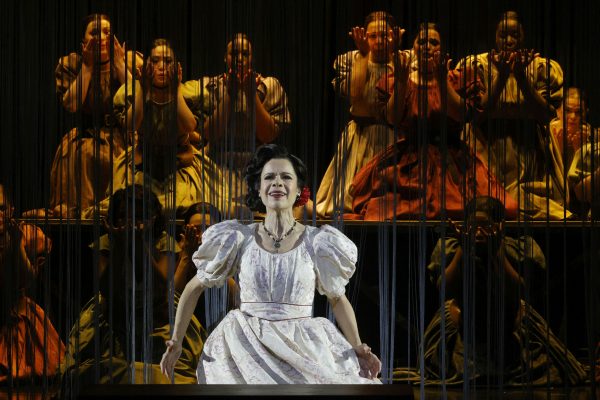
“Arcadia” – where past and present collide (a review)
It’s hard to imagine a more challenging playwright than Tom Stoppard, first brought to the attention of many of us with “Rosencrantz and Guildenstern are Dead.” And then there’s “Arcadia” (1993) which received a stellar performance 20 years ago at the Mark Taper Forum. I’ve waited ever since to see it again, professionally staged, and now the wait is over: A Noise Within, one of the most revered theater companies in Southern California, opened their new season with it a few days ago.
Although sometimes described as a comedy, “Arcadia” really consists of intellectually playful repartees, a sort of brainy high-stakes ping-pong match, and my hat’s off to the viewer who can follow every argument and counterargument. For all that, though, it’s a heady experience.
The entire play is set within the dining room of an English country house, Sidley Park, located in Derbyshire. Half the play takes place in 1809 and then 1812, and the other half in present times where two literary scholars, Hannah Jarvis (Susan Angelo) and Bernard Nightingale (Freddy Douglas), are trying to unravel mysteries and mysterious circumstances from roughly two centuries before. For Hannah’s it’s about the hermit in the hermitage, and for Bernard it’s about Lord Byron.

In 1809, young Thomasina Coverly (Erika Soto), who is 13 years old, is studying with her tutor Septimus Hodge (Rafael Goldstein). The girl is brilliant, likely a genius, and her observations about the workings of the universe are uncanny. I’ll just say that you’re at an advantage if you know a thing or two about iterative algorithims and Fermat’s last theory, not to mention the second law of thermodynamics (the one that shows that entropy steadily increases). But Thomasina, for all her smarts, is only working with a pencil, not a calculator. As her descendent Valentine Coverly (Tavis Doucette) astutely notes, “You can’t open a door till there’s a house,” meaning that she simply lacked the tools to carry her discovery to its fruitful conclusion.
In the early 19th century household we have other characters and other subplots, and both will prove significant later. Ezra Chater (Jeremy Rabb) is both a minor poet and a minor botanist, Richard Noakes (Eric Curtis Johnson) a landscape architect, Lady Croom (Abby Craden) the lady of the manor, Captain Brice (Stephen Weingartner) her brother, Augustus Coverly (Richy Storrs) her son, and Jellaby (Mitchell Edmonds) the butler. And, no, the butler didn’t do it.
In the present, in addition to the no-nonsense Hannah and the colorful, self-styled dandy Bernard, we have the Coverly descendants who still occupy the family home. These include the aforementioned Valentine, a mathematician who has chanced upon Thomasina’s writings, his younger sister Chloe (Jill Renner), who is 18, bubbly, and naive, and lastly Gus Coverly (Richy Storrs, again), a low-profile character who seems mute but at the same time I’d put my money on his being the inheritor of Thomasina’s genius.

“Arcadia” also zeroes in on chaos theory, epitomized by the noise or static that disrupts or deflects our calculations. During the Enlightenment, scientists and philosophers believed that the universe was like a big clock and that everything was determined. But what if there’s just one miscue? Remember Ray Bradbury’s short story, “A Sound of Thunder,” in which a time traveler steps off a carefully prearranged path, setting into motion a wealth of small changes that largely impact the future? Well, chaos theory in this play also has a lot to do with the characters’ sexual promiscuity two centuries ago. They too step off the path of propriety, with a resultant ripple effect.
Early on, Thomasina says to her tutor Septimus, “If you do not teach me the meaning of things, who will?” and towards the end of the play Hannah remarks, “It’s wanting to know which makes us matter.” And in between all this is quite a ride that’s reminiscent of such plays as “Proof,” “Copenhagen,” and “Q.E.D.,” all of which are engaging but demanding, too.
The actors are well cast, but at times it’s a bit hard to understand Goldstein and Renner, the first because his enunciation stays at a more even keel, almost in a monotone, and the latter because the lines are more chattered than spoken. I’m not saying they’re poorly delivered, just not theatrically delivered to carry clearly across a vast distance. It may be the acoustics as well. By way of contrast, Douglas has a true thespian’s voice, loud and clear, and he’d do wonders in a play by Oscar Wilde.
Costumes, set, staging, direction (by Geoff Elliott), everything is superb. While it’s quite a trek to this theater, the work’s a gem, pure and simple.
Arcadia is onstage through Nov. 20 at A Noise Within, 3352 E. Foothill Blvd., Pasadena. It runs in repertory with Genet’s “The Maids”and then Molière’s “The Imaginary Invalid.” Tickets from $44. Information, (626) 356-3100 ext. 1 or go to anoisewithin.org. ER









